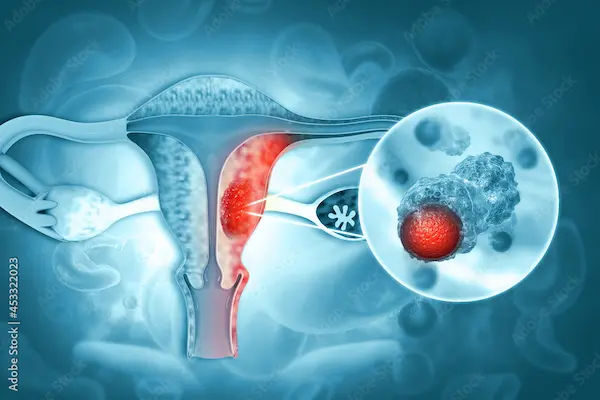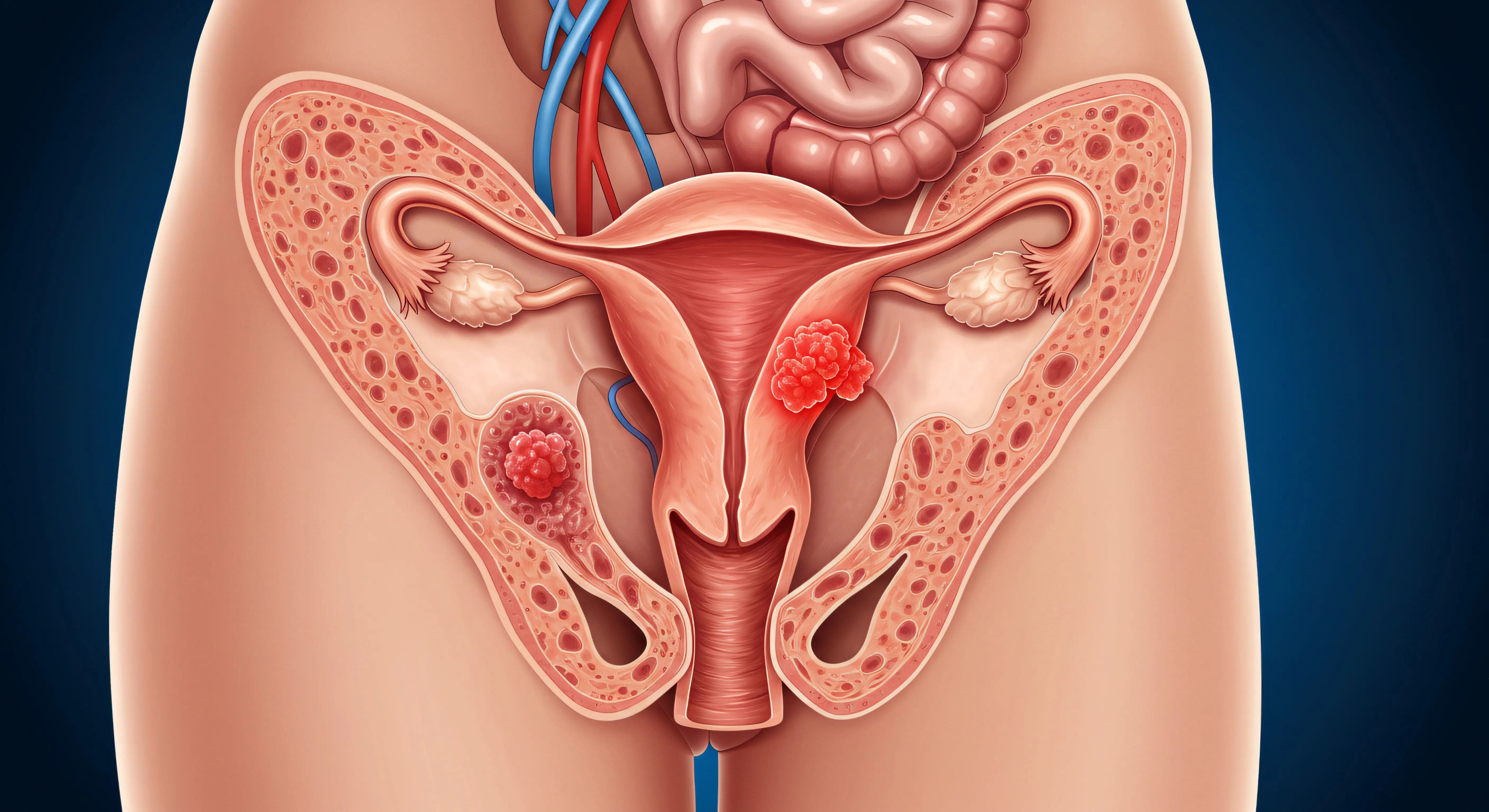Understanding Ovarian Cancer Basics
Learn the basics of ovarian cancer, including symptoms, causes, risk factors, diagnosis, and treatment options. Stay informed to detect it early and seek timely care.

Written by Dr. J T Hema Pratima
Reviewed by Dr. Shaik Abdul Kalam MD (Physician)
Last updated on 13th Jan, 2026
.webp?tr=q-80,f-webp,w-350,dpr-2,c-at_max 700w)
Introduction
Ovarian cancer is a serious health concern that affects thousands of women worldwide. While it can be a frightening diagnosis, understanding the basics, such as symptoms, causes, and treatment options, can help you stay informed and take proactive steps for your health.
What Is Ovarian Cancer?
Ovarian cancer occurs when abnormal cells in the ovaries grow uncontrollably, forming tumours. The ovaries are part of the female reproductive system and produce eggs (ova) as well as hormones like estrogen and progesterone. If left untreated, ovarian cancer can spread to other parts of the body, making early detection crucial.
Common Symptoms of Ovarian Cancer
Unlike some cancers, ovarian cancer often doesn’t show clear symptoms in its early stages. However, as the disease progresses, women may experience:
Bloating or swelling in the abdomen
Pelvic or abdominal pain
Feeling full quickly while eating
Frequent urination or urgency
Unexplained weight loss or gain
Fatigue
Changes in bowel habits (constipation or diarrhoea)
Irregular menstrual cycles
Since these symptoms can be vague and mimic other conditions (like digestive issues), many women overlook them. If you notice persistent symptoms lasting more than a few weeks, consult a doctor.
What Causes Ovarian Cancer?
The exact cause of ovarian cancer is unknown, but certain factors may increase the risk:
1. Age: Most cases occur in women over 50, particularly after menopause.
2. Family History: A family history of ovarian, breast, or colorectal cancer may raise risk due to inherited gene mutations (like BRCA1 or BRCA2).
3. Hormonal Factors: Women who have never been pregnant, started menstruating early, or had late menopause may have a slightly higher risk.
4. Obesity: Excess weight may contribute to hormonal imbalances linked to ovarian cancer.
5. Endometriosis: This condition, where uterine tissue grows outside the uterus, may increase risk.
How Is Ovarian Cancer Diagnosed?
If ovarian cancer is suspected, doctors may recommend:
Pelvic Exam: To check for abnormalities in the ovaries or uterus.
Imaging Tests: Ultrasound, CT, or MRI scans to detect tumours.
Blood Tests: CA-125 is a protein that may be elevated in ovarian cancer (though it can also rise due to other conditions).
Biopsy: Removing a small tissue sample for lab testing confirms cancer.
Early detection improves treatment success, so don’t hesitate to seek medical advice if you have concerns.
Get Your Symptoms Checked By An Oncologist
Treatment Options
Treatment depends on the cancer’s stage and type, but may include:
Surgery: Removing the tumour, one or both ovaries, or nearby affected tissues.
Chemotherapy: Using drugs to kill cancer cells, often after surgery.
Targeted Therapy: Medications that attack specific cancer cells with fewer side effects.
Hormone Therapy: For certain types of ovarian cancer influenced by hormones.
Your doctor will tailor treatment based on your health and cancer progression.
Can Ovarian Cancer Be Prevented?
While no surefire prevention exists, these steps may help reduce risk:
Birth Control Pills: Long-term use may lower risk (discuss with your doctor).
Healthy Lifestyle: Maintain a balanced diet, exercise, and avoid smoking.
Pregnancy & Breastfeeding: May slightly reduce risk.
Genetic Counselling: If you have a family history, genetic testing can assess risk.
When to See a Doctor
If you experience persistent symptoms like bloating, pelvic pain, or unexplained weight changes, don’t ignore them. Early diagnosis can make a significant difference in treatment outcomes.
Take Charge of Your Health with Apollo 24|7
If you have concerns about ovarian cancer or need a consultation, Apollo 24|7 offers expert care with experienced oncologists. You can:
Book a doctor’s appointment for personalised advice.
Schedule diagnostic tests for early detection.
Your health matters—stay informed and proactive.
Conclusion
Ovarian cancer can be challenging, but awareness and timely medical care improve outcomes. Pay attention to your body, know the symptoms, and seek help if something feels off. With the right support and treatment, many women successfully manage ovarian cancer and lead fulfilling lives.
Get Your Symptoms Checked By An Oncologist
Get Your Symptoms Checked By An Oncologist

Dr Devashish Tripathi
Radiation Specialist Oncologist
20 Years • MBBS, PLAB, MRCP (UK)- General Medicine, FRCR (Oncology), Certificate of Completion of Training (CCT)- Clinical Oncology
Delhi
Apollo Hospitals Indraprastha, Delhi

Dr. Harsh J Shah
Surgical Oncologist
15 Years • MS, MCh (GI), DrNB (GI)
Ahmedabad
Apollo Hospitals Gandhinagar, Ahmedabad

Dr. Amit Choraria
Surgical Oncologist
18 Years • MBBS, MS (Surgery) Fellow, Surgical Oncology, Tata Medical Center (FSO) Fellow, European Board of Surgery (Surgical Oncology) (FEBS) Fellow, Minimal Access Surgery (FMAS) Fellow, Indian Association of Gastrointestinal Endosurgeons (FIAGES) UICC Fellow, Royal Marsden NHS, London, UK Visiting Scholar, Plastic Reconstructive Surgery, CGMH, Taiwan Fellow, Robotic Surgical Oncology, Vattikuti Foundation, USA
Kolkata
Apollo Multispeciality Hospitals , Kolkata, Kolkata

Dr. Gopal Kumar
Head, Neck and Thyroid Cancer Surgeon
15 Years • MBBS, MS , FARHNS ( Seoul, South Korea ), FGOLF ( MSKCC, New York )
Delhi
Apollo Hospitals Indraprastha, Delhi
(25+ Patients)

Dr. Rupam Manna
Radiation Specialist Oncologist
7 Years • MBBS MD(RADIO THERAPY), CCEBDM
Barasat
Diab-Eat-Ease, Barasat




